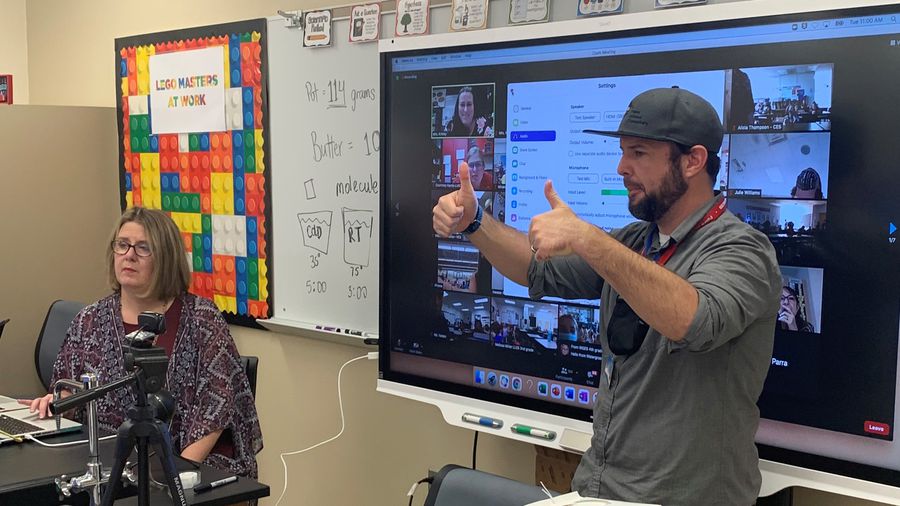
Lawmakers want to shake up Florida’s virtual school system
But some warn the proposal could undermine online programs offered by school districts.
Tampa Bay Times | By Jeffrey S. Solochek | February 21, 2022
State Rep. Randy Fine says Florida’s online education program needs an overhaul.
Crafted before the iPhone, the model that allows Florida Virtual School to offer classes and also franchise its curriculum has become too expensive and duplicative, the Palm Bay Republican argues. Florida Virtual gets about $280 million from the state to provide its classes, while districts also get per-student funding for their virtual classes, which often come from Florida Virtual.
Fine aimed to shake things up with the education budget implementing bill (HB 5101) he wrote as chairman of the House PreK-12 Appropriations subcommittee.
“Why reinvent the wheel when the wheel works fine?” he said, proposing that school districts no longer be allowed to franchise with Florida Virtual.
Florida law requires school districts to provide virtual course options for their students. This proposal would force them to look elsewhere for materials that meet state standards — potentially at a greater cost than what they are spending now.
Fine’s recommendations riled Pasco eSchool principal JoAnne Glenn, a statewide and national leader in online education. Glenn opened the Pasco program 12 years ago, and has grown it into one of the state’s largest virtual programs.
Hours after seeing the bill, she jumped into her car and drove to Tallahassee, to testify against the idea at its first committee stop. She challenged Fine’s contention that the district-level franchises are simply Florida Virtual with a different label and lower achievement results.

“The sponsor has made many concerning statements around the quality of the district programs and the necessity of the franchises,” said Glenn, who leads a consortium of Florida online instruction providers. “I am not going to let this go without trying to correct the incorrect or incomplete information being used.”
Glenn noted that school districts first received permission to take franchises when Florida Virtual acknowledged it had long waiting lists of students who could not access courses because it did not have enough instructors. All Florida high school students are required to take at least one online course to graduate.
Pasco, Hillsborough and Broward counties were among the first to join. Dozens of districts now have franchises, with Miami-Dade, Broward, Orange, Seminole and Pasco having the biggest participation. Pinellas County also has a Florida Virtual franchise.
Some of the districts’ online programs do not have student performance that matches what Florida Virtual achieves. But in many instances, the franchises outperform the Orlando-based school.
State Rep. Robin Bartleman, D-Weston, made that point clear during floor debate on the bill. For instance, Bartleman said, 21 franchises recently had better student scores on Algebra I than did Florida Virtual, while 10 bested Florida Virtual in civics and 11 did so in U.S. history.
Beyond that, Bartleman said, many of the districts go beyond presenting the basic curriculum. They add wraparound services, in-person instruction, additional course offerings and more, she said.
Pasco eSchool, for example, helped its district devise a live-remote model during the pandemic, when classrooms closed down. When schools cannot find qualified teachers for courses, Pasco eSchool has assigned its teachers to instruct those students.
Currently, Glenn said, her faculty is providing AP physics at one high school, geometry and Algebra 2 at another, and more classes at still other schools. All told, Pasco eSchool serves about 1,400 full-time students and another 8,000 students who take individual courses.
If deprived of the Florida Virtual franchise, Glenn said, school districts could be left scrambling to find materials and retrain teachers, possibly at higher costs, rather than continuing with what they see as successful programs already owned and developed by the state.

Fine said he did not want to have district-level programs that don’t provide such extras. He suggested that many of them started and expanded their franchises as a way to keep state student funding in their accounts.
The state changed virtual funding formulas in 2013, in a way that prompted many districts to take such steps.
But Fine added that he did not want to harm programs that have strong results and provide needed services.
“We’re not going to do anything that will hurt kids, I can promise you,” he said.
He told his House colleagues that his bill represented a “starting point” to “shock the system” into discussing improvements for virtual education in Florida.
“If there really are good reasons not to do it, I’m open to that,” Fine said.
Bartleman praised him on the floor, before the bill passed. Glenn said she would remain wary until she sees amendments come forward.
“The fact that he is signaling he is open to it definitely gives me reason to be optimistic,” Glenn said. “I hope we will be able to help shape the legislation so it supports all choices for families.”





